Discover every three months in this international issue of Voie Libre in english, new products reviews, layout descriptions, model building, historical information on secondary lines and prototypes...
Voie Libre international
SUBTLE BLEND
LR PRESSE A LOCOTRACTOR IN THE P'TITS KITS VOIE LIBRE RANGE
BEMO ABE 4/4 DRIVING UNIT N° 34
LILIPUT U37 0-6-2 T
TARAMFABRIEK ALLROUNDER, A BESPOKE DRIVING CHASSIS
MICRO-MINERS MINING LOCOMOTIVES
MODELLBAU ADORF BRIDGES
RÉGIONS & COMPAGNIES HALF-BUILDINGS
SOAP FOR YOUR PAINTBRUSHES
THE PETIT ANJOU IS RESTORING A POSTAL VAN
PRESS REVIEW
GOODBYE ANNETTE
AN 0 SCALE BRAKE VAN • Peco has released a range of wagons and skips, in kit form, which should delight 0 scale narrow gauge fans.
The mushroom farm or the art of the ‘galipette’* • Let's not be mistaken, the ‘galipette’ we are referring to here is a culinary specialty from the Touraine area, which calls on cultivated mushrooms. David tells us about his mushroom farm, from the cave to the table. All this with a train running round the facilities, of course!
TURNOUTS galore • Raymond and Jean-Rémy, who each show us how to build a home-made turnout, also give us the opportunity to take a look at what is available commercially in terms of H0 scale narrow gauge turnouts.
Industrial productions • When it comes to narrow gauge, there are not that many industrial or semi-industrial productions. We have selected Peco, Roco, Tillig, Bemo and MinitrainS, even though the latter, of a very artisan nature, does not quite belong in the same category!
How to connect the turnouts electrically
Building your own turnouts in H09 • Raymond tells us how to build turnouts whose geometry is exactly what we have drawn.
A turnout in 6.5mm gauge • Do you need a bespoke turnout? Jean-Rémy Hugounenec tells you how he did it!
The Commana SLATE QUARRY • It was at Junglister, in Luxemburg, that we discovered the highly Breton slate quarry of Commana, reproduced in 0-12 by Philippe Gerber, a Swiss modeller. Despite all this, we did not get lost in translation!
THE MONTS D'ARRÉE SLATE QUARRIES
The Spumoni Flyer • When Jim sent me his article, at first sight I saw nothing more than building a motor-trolley in American style. However, I soon became immersed in the world of Earl Loyd Moore, which Jim helped me discover.
The small Decauville vans
TRAMWAY FROM PITHIVIERS TO TOURY
In the yard • As we are looking at the shipment of peat and at the locotractors used for this purpose, the time has come to tackle a project that is focussed on the small Plymouth engine from the Atelier du Tacot range.
Sugar in THE DIESEL FUEL • In the 1930's, internal combustion engines, in particular those using «heavy oil», witnessed considerable improvements. Using them in large 60cm gauge locotractors, sufficiently powerful to replace steam traction on some sugar-beet railways, even became possible.
WOOD AND STEEL OPEN WAGONS… made of plastic! • In the 1920s, the recycling of 60 cm gauge military wagons by industry led to a great many conversions. Éric Fresné decided to model a few of them and to return to his first love: sugar-beet railways.
Port Dyzan HO-9 • Raymond Duton was interested by the “Port Dyzan” article, a layout built jointly by Alexis Avril and François Fontana, and published in the magazine Clés pour le train miniature for its tenth anniversary. He shows us how to adapt it to narrow gauge.
peat-filled SCENERY • Issue 119 of Voie Libre dealt with building a peat wagon in 1/35 scale. Using simple products and techniques, we show you here how to model a peat bog where the wagon can run. Pull on your wellies, damp ground...
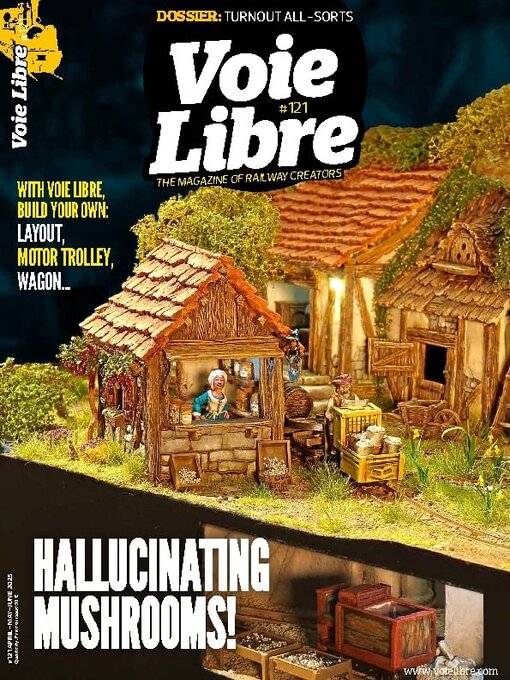
 APRIL / MAI / JUNE 2025 - 121
APRIL / MAI / JUNE 2025 - 121
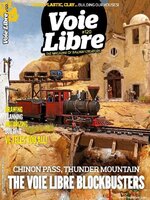 JANUARY / FEBRUARY / MARCH 2025 - 120
JANUARY / FEBRUARY / MARCH 2025 - 120
 OCTOBER / NOVEMBER / DECEMBER 2024 - 119
OCTOBER / NOVEMBER / DECEMBER 2024 - 119
 JULY / AUGUST / SEPTEMBER 2024 - 118
JULY / AUGUST / SEPTEMBER 2024 - 118
 APRIL / MAI / JUNE 2024 - 117
APRIL / MAI / JUNE 2024 - 117
 JANUARY / FEBRUARY / MARCH 2024 - 116
JANUARY / FEBRUARY / MARCH 2024 - 116
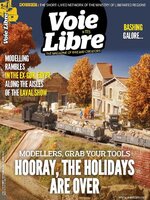 OCTOBER / NOVEMBER / DECEMBER 2023 - 115
OCTOBER / NOVEMBER / DECEMBER 2023 - 115
 JULY / AUGUST / SEPTEMBER 2023 - 114
JULY / AUGUST / SEPTEMBER 2023 - 114
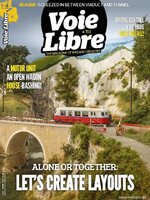 APRIL / MAY / JUNE 2023 - 113
APRIL / MAY / JUNE 2023 - 113
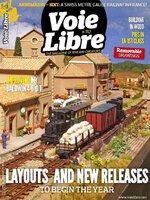 No.112
No.112
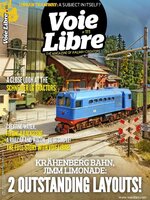 No.111
No.111
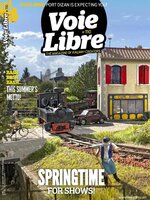 No.110
No.110
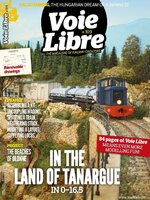 No. 109
No. 109
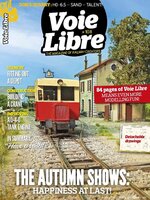 No. 108
No. 108
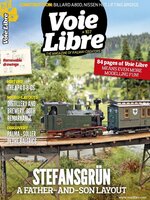 No. 107
No. 107